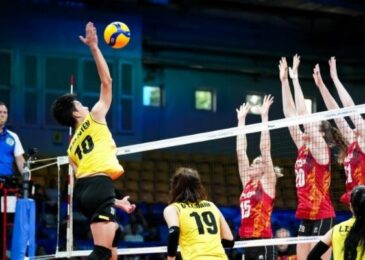Beach volleyball is not just about the athletes on the court; the referees play a crucial role in ensuring fair play and smooth matches. One such remarkable referee is Dan Apol, an American official who has been selected as one of the referees for the 2016 Olympics in Rio de Janeiro. In addition to beach volleyball, Apol will also officiate sitting volleyball during the Paralympics. Let’s dive deeper into his journey and the challenges faced by referees in reaching the pinnacle of their careers.
Bạn đang xem: Olympics: Celebrating the Human Spirit in Beach Volleyball Refereeing
The Path to the Olympics
Becoming an elite beach volleyball referee is no easy feat. Referees, like athletes, have success markers to achieve in order to advance in their careers. Every World Tour event is meticulously evaluated, and the reports from these events are compiled into a master scheme that determines who moves forward and who doesn’t. Apol explains, “The referee delegates make a report from every World Tour event we do, and all of that gets compiled into a master scheme for who moves on for the next year and who doesn’t.”
Language and Communication
Language proficiency is another essential aspect of being an international beach volleyball referee. Apol emphasizes that English is the required language for FIVB officials. However, there is a growing emphasis on learning a Latin language such as Portuguese, Spanish, or Italian. Referees who speak English as a second language also contribute to the diverse pool of officials at FIVB events. Apol has taken the initiative to learn Portuguese, given his frequent visits to Brazil. He shares, “Other referees have to put in a lot more work than I do. I try to put in work to learn and do the same amount of work they’re doing. I’ve been doing a lot of Portuguese. This is my ninth time in Brazil, so it helps.”
Referees in Top Shape
Officiating at the highest level also requires referees to be physically and mentally fit. Apol reveals that this year, a thorough referee seminar was conducted, incorporating medical evaluations, endurance tests, eye and hearing exams, and even sessions with a sports psychologist. Such comprehensive evaluations ensure that referees are well-prepared and equipped to handle the demands of their role. Apol shares, “Every once in a while, we do get stressed out. A session like that is something I’ve never done, and it was a cool experience.”
Building a Team of Olympic Referees
Xem thêm : The Randomness of Life’s Unexpected Turns
The Rio Grand Slam served as a unique opportunity for the Olympic referee delegation to come together as a team. Sixteen referees from 15 different countries, including two from Brazil, gathered for a seminar, marking the first time such an event was organized. Apol highlights the significance of this gathering and the camaraderie amongst the referees as they prepare for the Olympic Games.
The Road to Rio
Apol’s journey as a referee began almost two decades ago, but it was in 2010 that he started seeing significant success. Anticipation built up when the World Tour schedule for 2016 was released, giving Apol a good idea of his chances for selection. The waiting period for the confirmation letter was both exciting and nerve-wracking. When he finally received the news, it was a moment of triumph. Apol explains, “The suspense, the hoping months ahead of time, and waiting for that call was suspenseful. My wife had gotten up to get to work, and I was still in bed and checked my email. I got it, and she was downstairs. I yelled, and she came running up. She knew what it was.”
The Selection Process
The selection process for Olympic referees follows a similar format to the World Tour. Successes and failures during the World Tour have a direct impact on the selection for the Olympics. The decision for Olympic referee selection is made in October or November of the preceding year. Apol emphasizes the importance of assignments in the year leading up to the Olympics and how they contribute to a referee’s performance and chances of being selected.
A Journey of Travel
Like athletes, FIVB beach referees have a demanding travel schedule during the World Tour. Apol’s itinerary includes spending 66 days in Brazil this summer, officiating at the Paralympics, and then returning for the Long Beach Grand Slam. He acknowledges that the summer will be long and intense but believes it is all worth it. His passion for the sport and the opportunity to be a part of the Olympics is what drives him to go the extra mile.
FAQs
Q: How are referees selected for the Olympics?
A: Referees are selected based on their performance during the World Tour events leading up to the Olympics. Successes and failures have a significant impact on their chances of being chosen.
Xem thêm : Ready Or Not: U.S. Women’s Volleyball Begins Rio Push This Weekend
Q: What language do FIVB officials need to know?
A: English is the required language for FIVB officials, but there is an increasing emphasis on learning a Latin language such as Portuguese, Spanish, or Italian.
Q: How do referees maintain their physical and mental fitness?
A: Referees undergo thorough medical evaluations, endurance tests, and even receive sessions with a sports psychologist to ensure they are in top shape.
Conclusion
Being an Olympic referee is a pinnacle achievement for any beach volleyball official. Dan Apol’s journey exemplifies the dedication and hard work required to reach this level. As the 2016 Olympics approach, the excitement and anticipation build. The human spirit in sports is truly celebrated during this global event, and Apol feels privileged to be a part of it. The dedication and camaraderie amongst the referees ensure that the games run smoothly and fairly, providing the best experience for athletes and fans alike.
For more information about beach volleyball and the world of refereeing, visit Alpinetgheep.
Nguồn: https://alpinetgheep.com
Danh mục: Volleyball



